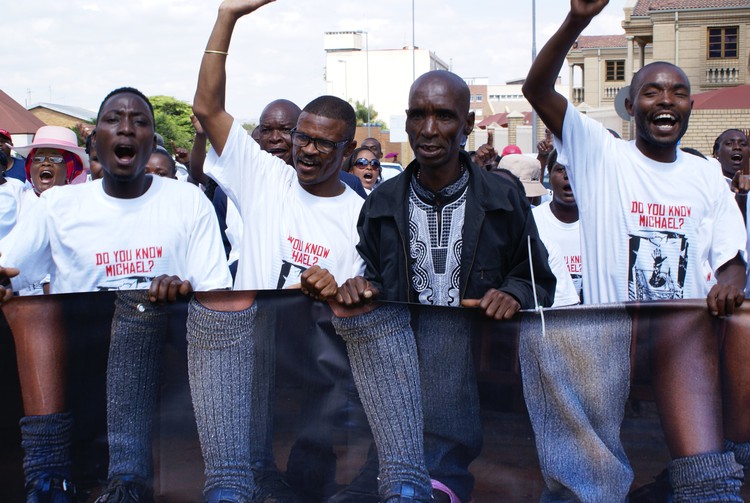Michael Komape’s family to appeal Limpopo High Court’s decision
Family is seeking nearly R3 million in damages
The Komape family is asking for leave to appeal the Polokwane High Court’s rejection of its claim for nearly R3 million in damages. The claim is against the Limpopo government following the death of five-year-old Michael Komape in a school pit latrine in 2014.
The family, represented by public interest law firm SECTION27, is asking that the appeal be heard in the Supreme Court of Appeal due to the importance of the legal and constitutional matters raised in the case. Should this fail, it wants a full bench of the Polokwane court to hear the matter. SECTION27 will be presenting its argument to the Limpopo High Court on Friday 1 June at 10am.
The case went to trial over two weeks in the Polokwane High Court in November last year. In April this year Judge Gerrit Muller delivered his verdict, dismissing the family’s claim for R940,000 in general damages and R2m in Constitutional damages. The only financial relief for the family was the award of R12,000 each for future medical expenses for two of Michael’s surviving siblings, Oniva and Maria.
Just before going to trial, the Limpopo Department of Basic Education offered the family R450,000 in full and final settlement of its claims. This was rejected as an “insult” by the family, which was pushing for close to R3m. It the end it got nothing, except the R12,000 for medical expenses for each of Oniva and Maria. A third sibling, Moses, received no award for medical expenses. SECTION27 is also appealing this.
There was one major victory for SECTION27 and the family: the judge then gave the Limpopo education department until 30 July to come up with a plan for the installation of “safe and secure” school toilets across the province. Evidence presented during the trial established that until 2011, 73% of schools in the province were using pit latrines.
In its appeal application, SECTION27 is arguing that Judge Muller erred in not awarding damages to the family as it was conceded by the state that the family had suffered emotional shock as a result of Michael’s death. All that should have been decided was the quantum of damages. The amount being claimed by the family was neither excessive nor unreasonable, and is consistent with damages awarded in previous comparable cases.
The appeal application also suggests the judge confused two different claims made by the family: one for emotional shock, and the other for grief (it also asked for the judge to develop common law on this claim). It was not contested by the state that the family had suffered emotional shock, which was the subject of extensive cross-examination during the trial.
The family relied on an earlier 2016 case heard in the Supreme Court of Appeal, Mbhele v MEC for Health Gauteng Province, where “proof of psychiatric lesion or illness by expert evidence was a precondition for compensation”. SECTION27 produced expert evidence at trial to prove the emotional shock suffered by the family, and argues that the judge was bound to follow this precedent set in the Mbhele case.
The family is also appealing the court’s decision not to develop common law surrounding a second claim for grief. The common law, as it stands, “fails to distinguish claims based on serious breaches and violation of fundamental rights, and prevented the vindication of constitutional rights and as well as the granting of appropriate relief in terms of section 38 of the Constitution,” says the appeal application.
The Komape family are marginalised members of society lacking the skills and resources to assert their rights, and for this reason the court’s failure to establish common law “had a chilling effect” their right of access to court and their constitutional rights, argues SECTION27.
“The respondents were no ordinary delictual (wilful) wrongdoers, but were state actors who had the unmistakable constitutional obligations to protect, promote and fulfil the applicants’ constitutional rights,” says the appeal.
It also says the Judge erred in finding that recognition of the family’s claim for grief would result in “bogus and unwarranted proliferation of claims for psychiatric injuries.” The judge declined to recognise the development of the common law claim for grief on that basis. There was no evidence before the court to justify this conclusion, says SECTION27.
It also says that in refusing the family’s claim for constitutional damages on the grounds that this would amount to over-compensation, the judge failed to heed the different purpose behind the different claims for damages.
SECTION27 contends that it has reasonable prospects of success on appeal.
A previous article by GroundUp explains the judge’s reasoning.
CORRECTION: The article originally said Michael Komape’s age was four at the time of his death. It was five.
© 2018 GroundUp.
This article is licensed under a Creative Commons Attribution-NoDerivatives 4.0 International License.
You may republish this article, so long as you credit the authors and GroundUp, and do not change the text. Please include a link back to the original article.



